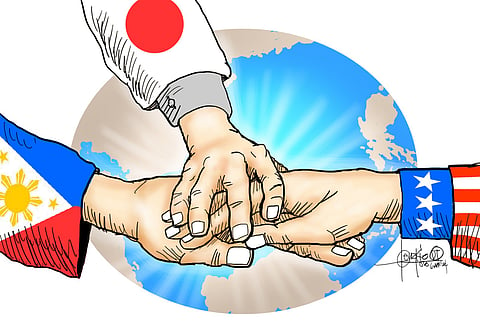
- NEWS
- the EDIT
- COMMENTARY
- BUSINESS
- LIFE
- SHOW
- ACTION
- GLOBAL GOALS
- SNAPS
- DYARYO TIRADA
- MORE

The unprecedented trilateral alliance among the Philippines, the United States, and Japan that will be forged in Washington next week will, among other things, guarantee diversification — that the country does not put its eggs in one basket.
The agreement, along with the other defense deals with allies in the region, ensures that the country does not risk its security due to a sudden shift in the US political climate.
The Philippines might worry that the Americans are again looking for a way out, particularly with a Donald Trump victory in the November polls.
Filipinos have heard empty pronouncements before. The Philippines and the world are facing another sea change in global politics if former President Trump, notorious for his America First battle cry, retakes Washington.
In his first term, Trump withdrew the US from most international groupings after adopting a domestic priority in his policies.
Despite the oft-repeated pledge of an “iron-clad” commitment to come to the defense of the Philippines under the Mutual Defense Treaty, the Americans thus far have not taken any significant steps to match their fighting words.
The Chinese have the US government all figured out — that as long as they don’t use conventional arms, the Americans won’t do much.
The US government’s recent use of sharp warnings and nothing else just proved Beijing right.
Grant Newsham, a senior research fellow at the Japan Forum for Strategic Studies, noted the differences in the wording of a treaty.
“There’s also the spirit of a treaty. And that’s as important, at least when dealing with honest people,” according to Newsham.
He deduced that the MDT presumably did not intend to allow an enemy to use water cannons and a swarm of ships to occupy and seize Philippine territory. “Otherwise, what’s the point of a treaty?”
Thus, he said, either the Biden administration gives the Philippines the help it needs that was promised under the spirit of the treaty — and it runs the risk of a fight with China — or it accepts humiliation at the hands of the Chinese and retreats.
Newsham believes it’s not just Filipinos watching what Washington will do next but everyone else in Asia and beyond.
The response to the Philippine situation, thus, is a gauge of US promises of protection, “explicit or implicit.”
He acknowledged that the Japanese are quietly doing a lot for the Philippines but will maintain a low profile.
“It would be nice if Japan Coast Guard ships helped out, but that’s unlikely,” Newsham reckoned.
The Japanese and Philippine governments have begun considering regular rotational deployments of Japan’s Self-Defense Forces to the Philippines.
Japan, nonetheless, is saddled with a pacifist Constitution that outlaws war as a means of settling international disputes involving the state.
Nonetheless, the Philippines is receiving valuable assistance from Japan. The information protection agreement on the agenda of the trilateral meeting in Washington is pivotal as cyberattacks on public and private systems are on the uptrend.
A bilateral visiting forces agreement, which will facilitate joint exercises with the SDF, is also expected to be signed soon.
Tokyo is also looking to install satellite communication systems on Philippine patrol vessels and develop a Philippine Coast Guard base at Subic Bay that could host the agency’s two 97-meter, Japan-made patrol vessels.
In the cards are joint naval patrols in the West Philippine Sea that may start this year, a first for Tokyo and which will further antagonize Beijing.
While the US’ recent pronouncements are pleasant to hear, the country’s history of relations with the superpower and its recent actions prove that it will be up to the Philippines to ensure its own “iron-clad” protection.
